Words of Wisdom - Shastra
& Shastrakaras speak
For Books and shastra downloads see Main Index, under
Books:
Om Namo Bhagavate Vasudevaya
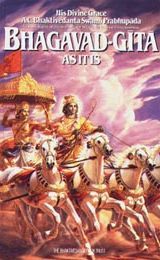
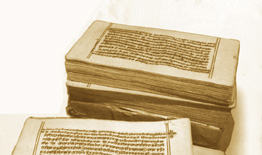
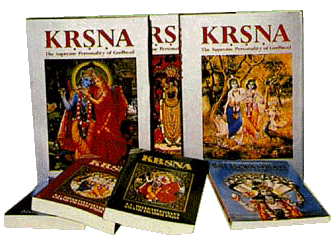
The Complete Works of Srila Prabhupada
All the books, the letters and conversations at your
fingertips
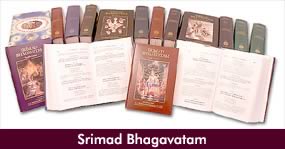
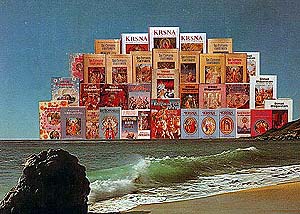
All Srila Prabhupada's books and more on one disk
http://www.vedabase.com




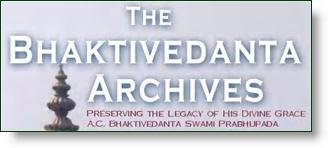
Srila Prabhupada's Audio lectures to listen to on-line:
http://www.hare-krishna.org/srila-prabhupada-lectures.htm
Listen to Srila A.C. Bhaktivedanta Swami Prabhupada on-line
- all 900 of his lectures are available HERE:
http://www.prabhupadavani.org/
Srimad Bhagavatam - the entire lecture series listen and
read along on-line - Narrated by Amala Bhakta dasa:
http://www.prabhupadavani.org/SB_index.html
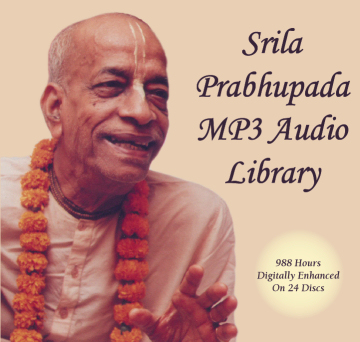
The new enhanced Prabhupada MP3 series
http://www.prabhupada.com/store/store.php?page=product.php&id=MP3AUDIOLIB

Srila Prabhupada Vyasa-puja book 2007
http://www.krishna.com/node/1048
Vyasa-puja is an annual celebration by the devotees of Lord Krishna
to offer homage to their guru, or spiritual teacher.
There are two versions of the Vyasa Puja Book based on the speed of
your internet connection.
If you are unable to open the file, download Acrobat Reader.
High speed connections, with pictures.
Vyasa-puja
Book 2007 [PDF/ZIP, 2.11MB]
Low speed connections, no pictures.
Vyasa-puja
Book 2007 (no pictures) [PDF/ZIP, 2.11MB]








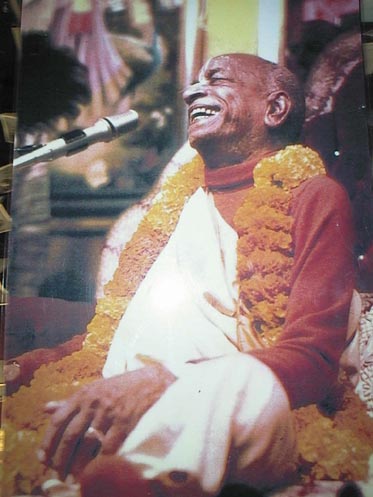
Visit "Prabhupada Connect" for all manner of Prabhupad
Nectar:
http://www.prabhupadaconnect.com/Index.html
Srila Prabhupada's Final Lesson Video - Downloadable and
viewing on-line
http://users.iskconludhiana.com/images/thumbnails.php?album=21


All Srila Prabhupada's original books
available for sale here.

Download all the Hare Krsna teachings which includes
all Vaisnava and
Vedic concepts by visiting one of the sites listed at
the following address.
http://www.geocities.com/suci123/bookdownloadsites1.html
The Bhaktivedanta Book Trust
Srila Prabhupad Memorial Library
http://www.krishna.com/main.php?id=33


33 Books Online Including Srimad Bhagavatam!
http://www.geocities.com/freeprabhupadabooks
The compressed "self extracting" file mentioned is now currently
available for download
http://www.krsnaconsciousness.org/Gauranga/Folio/BhaktivedantaVedabase_DOS.exe

Download or Listen to Prabhupad Bhajans HERE:
http://www.prabhupadavani.org/web/text/Bhajans.html


On-line 1972 McMillan edition - Bhagavad Gita As It Is:
http://www.asitis.com/

Bhagavad Gita AS IT IS on-line through the Tirupathi
Balaji site:
http://www.bhagavad-gita.us/

Bhagavad Gita Study guide on-line book:
http://chantandbehappy.com/gita/studyguide/StudyGuide-main.htm
Bhagavad Gita Study guides by numerous Iskcon devotees
- FREE downloads:
http://www.veda.harekrsna.cz/library/#3

All the Scriptures you'd ever need 4 FREE
http://www.hknet.org.nz/index-books.htm
http://www.hknet.org.nz/DDB.htm
http://www.hknet.org.nz/DDB2.html
last updated 4th August 2003


Srimad Bhagavad Gita AS
IT IS
Bhagavad Gita: Chapter
6 - Dhyana-yoga
TEXT 37
arjuna uvaca
ayatih sraddhayopeto
yogac calita-manasah
aprapya yoga-samsiddhim
kam gatim krsna gacchati
WORD FOR WORD
arjunah uvaca--Arjuna said; ayatih--the unsuccessful transcendentalist;
sraddhaya--with faith; upetah--engaged; yogat--from the mystic link; calita--deviated;
manasah--who has such a mind; aprapya--failing to attain; yoga-samsiddhim--the
highest perfection in mysticism; kam--which; gatim--destination; krsna--O
Krsna; gacchati--achieves.
TRANSLATION
Arjuna said: O Krsna, what is the destination of the unsuccessful
transcendentalist, who in the beginning takes to the process of self-realization
with faith but who later desists due to worldly-mindedness and thus does
not attain perfection in mysticism?
PURPORT by HDG Srila A. C. Bhaktivedanta Swami Prabhupada:
The path of self-realization or mysticism is described
in the Bhagavad-gita. The basic principle of self-realization is knowledge
that the living entity is not this material body but that he is different
from it and that his happiness is in eternal life, bliss and knowledge.
These are transcendental, beyond both body and mind.
Self-realization is sought by the path of knowledge, by
the practice of the eightfold system or by bhakti-yoga. In each of these
processes one has to realize the constitutional position of the living
entity, his relationship with God, and the activities whereby he can reestablish
the lost link and achieve the highest perfectional stage of Krsna consciousness.
Following any of the above-mentioned three methods, one is sure to reach
the supreme goal sooner or later. This was asserted by the Lord in the
Second Chapter: even a little endeavor on the transcendental path offers
a great hope for deliverance. Out of these three methods, the path of bhakti-yoga
is especially suitable for this age because it is the most direct method
of God realization. To be doubly assured, Arjuna is asking Lord Krsna to
confirm His former statement. One may sincerely accept the path of self-realization,
but the process of cultivation of knowledge and the practice of the eightfold
yoga system are generally very difficult for this age. Therefore, despite
constant endeavor one may fail, for many reasons. First of all, one may
not be sufficiently serious about following the process. To pursue the
transcendental path is more or less to declare war on the illusory energy.
Consequently, whenever a person tries to escape the clutches of the illusory
energy, she tries to defeat the practitioner by various allurements. A
conditioned soul is already allured by the modes of material energy, and
there is every chance of being allured again, even while performing transcendental
disciplines. This is called yogac calita-manasah: deviation from the transcendental
path. Arjuna is inquisitive to know the results of deviation from the path
of self-realization.
His Divine Grace A.C. Bhaktivedanta Swami Prabhupada
Copyright 1983 The Bhaktivedanta Book Trust International. Used with
permission.

Bhagavad Gita As It Is - http://www.asitis.com/
Bhaktivedanta Vedabase - Bhagavad Gita on-line http://bhagavadgitaasitis.com/
Bhaktivedanta VedaBase: Bhagavad-gita As It Is http://vedabase.net/bg/en
Bhagavad Gita Multi Media Web-version http://chantandbehappy.com/gita/
Listen to Bhagavad Gita on line - http://www.Gitamrta.org
View our Bhagavad Gita Overview:
http://www.hknet.org.nz/BG.html
Archive: http://www.cs.rice.edu/~vivek/btg/archive/
Home Page: http://www.cs.rice.edu/~vivek/btg/
Join Bhagavad Gita eGroups HERE
mailto:bhagavad_gita-owner@egroups.com


Prabhupada Uvacha:
(here's some nectar, sometimes it comes in the form of Srutakirti prabhu's
diary, other times from Govinda dasi's diary, Hari Sauri prabhu's Transcendental
Diary, Bhurijan prabhu's book, or sometimes from a letter, or other related
source, but still nectar...)
Service as an Opportunity
Prabhupada: A devotee should not take up some
business which requires very hard endeavor. No. We should take up only
simple things. Of course, a devotee does take risks. Just like Hanuman,
the servant of Lord Ramacandra. Lord Ramacandra wanted information about
Sitadevi. So Hanuman did not consider, "How I shall go to the other side
of the sea to Lanka?" He simply, believing in Lord Ramacandra, calling
"Jaya Rama," jumped over it.
Hanuman jumped to Lanka, but Ramacandra Himself
had to construct a bridge. Of course, that bridge is also wonderful because
the monkeys were bringing stones and throwing the stones into the sea.
But the stones were floating. Where is the law of gravitation? Stones floating
on the water? It cannot be done by the scientists. But Lord Ramacandra
desired, so the stone became able to float. Otherwise how many stones we
shall throw into the sea that it will come to the level of becoming a bridge?
But Lord Ramacandra wanted, "Let it be simplified for the monkeys. So let
them bring the stones and they will float. Then we shall go."
Without stone He Himself could go, but He wanted
some service from the monkeys. There were many other monkeys who were not
capable exactly like Hanuman. Therefore they were also given some chance
that "You bring some stone. You cannot jump over the sea like Hanuman,
so you bring stones, and I will ask the stones to float."
We should accept service as an opportunity, whether
we feel ourselves capable or not. Ultimately, if Krsna desires, our service
will be completed. Our real success will be our sincere devotional attempts.
- From the "My Glorious Master" by HG Bhurijana
dasa
To receive little snippets of nectar like this on a daily basis subscribe
HERE: or If you want to introduce anyone else in reading Srila Prabhupada
Nectars, please send their eMail addresses to mailto:krpamaya_gauranga@hotmail.com
Please Chant:
 Hare
Krishna Hare Krishna Krishna Krishna Hare Hare
Hare
Krishna Hare Krishna Krishna Krishna Hare Hare
 Hare
Rama Hare Rama Rama Rama Hare Hare
Hare
Rama Hare Rama Rama Rama Hare Hare
...................and be Happy

Listen to Srila Prabhupad on-line
....a different lecture, morning walk, conversation or
class daily.
"No Intelligent Words For This
Age"
Srimad-Bhagavatam 1.3.21
September 26, 1972, Los Angeles
Listen to the entire lecture on-line:
http://prabhupadaradio.com/M3U/Bhagavatam/m3u_II/SB076.m3u
Pradyumna: (leads chanting, etc.)
tatah saptadase jatah
satyavatyam parasarat
cakre veda-taroh sakha
drstva pumso 'lpa-medhasah
Translation: "Thereafter, in the seventeenth incarnation
of Godhead, Sri Vyasadeva appeared in the womb of Satyavati, wife of Parasara
Muni, and he divided the one Veda into several branches and sub-branches,
seeing that the people in general were less intelligent."
Prabhupada: So this Parasara actually was not husband
of Satyavati. When Satyavati was not married, Parasara gave birth to Vyasadeva.
Later on Satyavati became the wife of Maharaja Santanu, father of Bhismadeva.
This Satyavati was the daughter of a fisherman. She was neither born of
a brahmana father or ksatriya father. So formerly, a higher-caste man could
accept a girl born of lower caste, but a lower-caste man could not accept
a girl born of higher caste. That was the system. Because in the sastra
it is... Ordinary, I mean to say, instructive sastra.
Just like Canakya, in his moral lessons, he says that
visad apy amrtam grahyam. When there is a tub of poison, but, if there
is little nectar, then you take it. Don't think that "It is in the poison
pot, why shall I take it?" No, you can take it. Visad apy amrtam grahyam
amedhyad api kancanam. Suppose in a very filthy place where people pass
stool, urine, there is some gold. So you should take it. Don't think that
because the gold is in the polluted place, gold has become polluted. No.
You take it. Visad apy amrtam grahyam amedhyad api kancanam, nicad apy
uttama vidya. Vidya, education, was to be received from a brahmana, because
it was the brahmana's business to become highly learned scholar and make
others educated. Teacher's business was entrusted to the brahmanas, administration
to the ksatriyas, production to the vaisya, and labor to the sudra. So
because generally we have to take education from highly learned brahmana,
but if a person born in low family, he has got some talent, education,
so don't hesitate. Take from him. Not that, "Oh, he is low born. Why shall
I take education from him?" No. The sastra says, "No, you can take. It
doesn't matter. He has got the learning. You take that. Make him a teacher."
Nicad apy uttama vidya stri-ratnam duskulad api. Stri-ratnam. If a girl
is very qualified, beautiful, even she is born of a low family, you can
accept her. This is the injunction of the sastras.
So Satyavati happened to be a daughter of a fisherwoman,
and, but she was very qualified, beautiful. So before her marriage, Vyasadeva
was born out of her womb. It is not that..., that before marriage girls
were not giving birth to child. It was there, the society. But the society
was so elevated that this was not done commonly. In extraordinary cases.
So Satyavati gave birth to Vyasadeva, such a son, Vyasadeva, incarnation
of God. Vyasadeva is not ordinary being. An incarnation of Narayana. And
he was meant for expanding Vedic knowledge. Then again, Vyasadeva was born,
but nobody could understand. She remained a virgin girl by the blessings
of Parasara Muni. Then she was again attractive to Maharaja Santanu. Maharaja
Santanu became attracted by Satyavati, and he wanted to marry. But Maharaja
Santanu had his son. So her father objected. So king proposed to the fisherman
that "I want to marry your girl." So the father said, "No, no, I cannot
allow my girl to marry with you because you are already married. You have
got your son, elderly son, Bhismadeva." So he was a little sorry, Santanu
Maharaja.
The son could understand that "The father is sorry because
he was refused the hand of the girl Satyavati." So he approached father.
Not father. He approached the father of Satyavati, that "Why you are refusing
my father?" "No. You are present. How can I offer my daughter?" "No. Even
if I am present..." Because the law is the eldest son will be enthroned
after the death of the father. So he was eldest son. So Satyavati's father
was hesitating. So Bhismadeva promised that "I will not accept the throne.
The child born of Satyavati, he will accept, he will be given the throne.
You give your daughter to my father." He still refused. He still, "Well,
our son may be king, but then again, your son will become the king." In
this way, he was hesitating. So Bhismadeva immediately promised that "I
shall never marry. Don't hesitate." So in this way he induced the fisherman
to give his daughter to his father.
So father could understand that "My son is so great that
he wanted to satisfy. I wanted this girl, and he has managed." So he gave
him a benediction to Bhismadeva, "My dear son, you are so benevolent, so
magnanimous. So I give you one benediction that you'll not die unless you
desire to die. Unless you fix up your mind, ‘Now I shall die,' you'll never
die. You remain a very strong brahmacari." So Bhisma remained very strong
brahmacari. There is another incidence of Bhismadeva's life, that Pandu-vamsa.
So one girl was attracted. So she was conquered. So the girl thought that
"I will be able to marry Bhismadeva," but when she came at home, Bhismadeva
said, "No, you have been conquered to be married with my brother. I am
brahmacari. I cannot marry you." So the girl said that "You have kidnapped
me, conquered me. You must marry." So "No, I shall not marry." Then the
girl approached to his spiritual master, this Jamadagni, Bhrgupati, that
"This boy he has conquered me. Still, he is not marrying me." So Jamadagni
said, "Bhisma, you must marry this girl." Bhismadeva said, "No. I have
promised to my father never to marry. I cannot marry." Then Jamadagni said,
"If you don't marry, then I will force you to marry." So there was fight
between Bhismadeva, spiritual master and... (laughter) So the spiritual
master became defeated. (laughter) Then he gave his blessings. "All right,
you remain brahmacari." (laughter)
continued..........
Listen to the entire lecture on-line:
http://prabhupadaradio.com/M3U/Bhagavatam/m3u_II/SB076.m3u
or receive in mailbox and Subscribe HERE:
mailto:lectures-subscribe@prabhupadavani.org
Sravanam kirtanam at:
http://www.PrabhupadaVani.org
© 2001 The Bhaktivedanta Book Trust International. Used with permission.

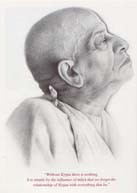
SRILA PRABHUPADA'S QUOTE OF THE DAY
...the Christians are following
Christ, a great personality. Mahajano yena gatah sa panthah. You follow
some mahajana , a great personality... You follow an acarya . Like the
Christians--they follow Christ, an acarya . The Muhammadans--they follow
an acarya, Muhammad. That is good. You must follow some acarya ... Evam
parampara-praptam .
Conversation, Melbourne 1975
Sign-up to receive these quote HERE:
mailto:haribol@pacific.net.sg

Bhaktivedanta Vedabase Network ...
http://vedabase.net/


The Scientific - Mathematical
Proof for God's existence:
http://geocities.com/sector114
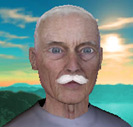
http://robot-hosting.com/php/login_nicholas.html
user name = guest
password = guest
(Collection of philosophical and mathematical proofs
for existence of God can be found in this site.)

Scientifically Philosophical Books for the layman
 ...
... ...
...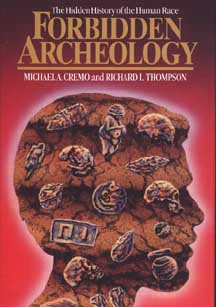 ...
...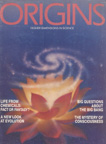
Click on any of these books to read more about them and where to get
a copy
or contact your local temple for purchases
sample of Life
comes from Life HERE.pdf

Lotus Imprints - Preserving Prabhupada's Legacy - The
Publishing House of Hari Sauri dasa
http://www.lotusimprints.com/

Quotes from Shastra - scriptures
View using Balaram font
Chaturmasya Vrata
"The Cäturmäsya period
begins in the month of Äñäòha (June-July) from
the day of Ekädaçé called Çayanä-ekädaçé,
in the fortnight of the waxing moon. The period ends in the month of Kärtika
(October-November) on the Ekädaçé day known as Utthänä-ekädaçé,
in the fortnight of the waxing moon. This four-month period is known as
Cäturmäsya. Some Vaiñëavas also observe it from the
full-moon day of Äñäòha until the full-moon day
of Kärtika. That is also a period of four months. This period, calculated
by the lunar months, is called Cäturmäsya, but others also observe
Cäturmäsya according to the solar month from Çrävaëa
to Kärtika. The whole period, either lunar or solar, takes place during
the rainy season. Cäturmäsya should be observed by all sections
of the population. It does not matter whether one is a gåhastha or
a sannyäsé. The observance is obligatory for all äçramas.
The real purpose behind the vow taken during these four months is to minimize
the quantity of sense gratification. This is not very difficult. In the
month of Çrävaëa one should not eat spinach, in the month
of Bhädra one should not eat yogurt, and in the month of Äçvina
one should not drink milk. One should not eat fish or other nonvegetarian
food during the month of Kärtika. A nonvegetarian diet means fish
and meat. Similarly, masüra dhal and urad dhal are also considered
nonvegetarian. These two dhals contain a great amount of protein, and food
rich in protein is considered nonvegetarian. On the whole, during the four-month
period of Cäturmäsya one should practice giving up all food intended
for sense enjoyment."
Sri Chaitanya Charitamritam Madhya
lila 4:169 purport.
See more about Chaturmasya BELOW:


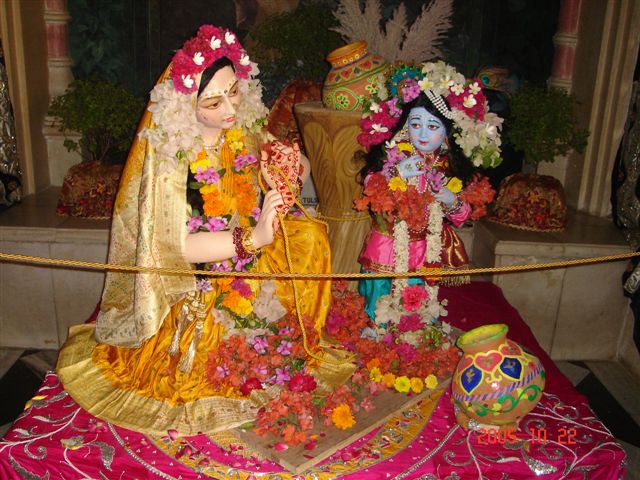

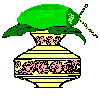 The
Month of Karttika Begins
The
Month of Karttika Begins
Festivals in the Holy Month of Karttika
(27th October - 24th November 2007 )(in NZ)
 Information
about the Karttika vratam:
Information
about the Karttika vratam:
 Kartika
Mahatmya from Hari Bhakti Vilas: - all the benefits of the month of Kartika
Kartika
Mahatmya from Hari Bhakti Vilas: - all the benefits of the month of Kartika
 Bahulastami
- Radha kunda snan dan
Bahulastami
- Radha kunda snan dan
 Diwali
- Dipavali - Dip dan - Akash Dipa (Significance of the various days
of the Diwali period):
Diwali
- Dipavali - Dip dan - Akash Dipa (Significance of the various days
of the Diwali period):
 Go-puja
- Go Krd
Go-puja
- Go Krd
 Govardhan
Puja - Annakuta
Govardhan
Puja - Annakuta
 Srila
A.C. Bhaktivedanta Swami Prabhupada's Tirubhava - Commemorative day of
His passing - Samadhi - Vrindavan
Srila
A.C. Bhaktivedanta Swami Prabhupada's Tirubhava - Commemorative day of
His passing - Samadhi - Vrindavan
 Padma
Purana on Kartika Vrata
Padma
Purana on Kartika Vrata
 Quotes
from the Dik-darshini tika commentary of Srila Sanatan Goswami, on Srila
Gopal Bhattar Goswami's Hari Bhakti Vilas.
Quotes
from the Dik-darshini tika commentary of Srila Sanatan Goswami, on Srila
Gopal Bhattar Goswami's Hari Bhakti Vilas.
 Significance
of each of the Days of Kartika
Significance
of each of the Days of Kartika
 Glories
of Kartika from Srila Rupa Goswami and Srila A.C. Bhaktivedanta Swami Prabhupada
Glories
of Kartika from Srila Rupa Goswami and Srila A.C. Bhaktivedanta Swami Prabhupada
 Damodara
vrata
Damodara
vrata
 Damodarastakam
Tika of Sanatan Goswami
Damodarastakam
Tika of Sanatan Goswami
 Bhishma
panchaka fast for Karttika
Bhishma
panchaka fast for Karttika
 Haribodhini
(Prabodhini) ekadasi - When the Lord wakes up
Haribodhini
(Prabodhini) ekadasi - When the Lord wakes up
 The
glories of the Month of Karttik - in one .pdf file - a must read
The
glories of the Month of Karttik - in one .pdf file - a must read
 How
the followers of Madhwacharya follow the Festivals of Kartika (2005)
How
the followers of Madhwacharya follow the Festivals of Kartika (2005)
 Navaratri
and Dusserha
Navaratri
and Dusserha
 Shaligram
Tulasi Vivaha
Shaligram
Tulasi Vivaha
All pictures from Srimad Bhagavatam above - Copyright ©2005 The
Bhaktivedanta Book Trust
International, on the web at .http://www.krishna.com/.
Used with permission.
Courtesy of http://www.vedabase.com/
used
with permission

Sri Dik Darshini Tika and Hari Bhakti Vilas on the Month
of Karttika,
Urja Vrata, Damodar Utsav seva, Akash Dipa:
http://www.salagram.net/parishad76-k.htm
http://www.hknet.org.nz/parishad76-k.htm
KARTIKE'SMIN VISESENA NITYAM KURVITA VAISNAVAH
DAMODARA ARCANAM PRATAH SNANA DANA VRATA ADIKAM
(HARI BHAKTI VILASA 16/3 from SKANDA PURANA)
Specifically in the month of Damodara, one should daily worship
Lord Damodara and take bath early in the morning, give charity and follow
a fasting vow. This is the duty of Vaisnavas.
NIYAMENA VINA VIPRAH KARTIKAM YAH KSIPEN NARAH
KRSNA PARAN-MUKHAS TASYA YASMAD URJO'SYA VALLABHAH
(HARI BHAKTI VILASA 16/24 from PADMA PURANA conversation between Narada
Muni and Saunaka Rsi)
Oh brahmanas, any person who tries to observe a Karttika month
without following rules and regulations properly, Lord Sri Krsna remains
against them because this month (Karttika) is very pleasing to Him.
YAIR NA DATTAM HUTAM JAPTAM NA SNANAM NA HARER VRATAM
NA KRTAM KARTIKE PUTRA DVIJAS TE VAI NARADHAMAH
(HARI BHAKTI VILASA 16/25 from SKANDA PURANA)
Oh son Narada, those brahmanas who do not give charity in the
month of Karttika, perform sacrifice, chant japa and fast for Lord Hari
are the lowest of mankind.
KARTIKA KHALU VAI MASAM SARVA MASESU CA UTTAMAM
PUNYANAM PARAMAM PUNYAM PAVANANAM CA PAVANAM
(HARI BHAKTI VILASA 16/36 from SKANDA PURANA)
The month of Karttika is the topmost of all other months. It is
the most meritorious and purified of all other pure months.
NA KARTIKA SAMO MASO NA KRTENA SAMAM YUGAM
NA VEDA SADRSAM SASTRAM NA TIRTHA GANGAYA SAMAM
KARTIKAH PRAVARO MASO VAISNAVANAM PRIYAH SADA
KARTIKAM SKALAM YASTU BHAKTYA SEVATE VAISNAVAH
(HARI BHAKTI VILASA 16/39,40 from SKANDA PURANA)
There is no other month equal to Karttika and there is no other
yuga equal to Krta-yuga. There is no other scripture equal to Vedas. There
is no other place of pilgrimage equal to Ganges, therefore, the month of
Karttika is very dear to the Vaisnavas (people dedicated to Visnu).
DVADASU API MASESU KARTIKAH KRSNA VALLABHAH
TASMIN SAMPUJITO VISNUR ALPAKAIR APY UPAYANAIH
DADATI VAISNAVAM LOKAM ITI EVAM NISCITAM MAYA
(HARI BHAKTI VILASA 16/41 from PADMA PURANA)
Among all twelve months, the month of Karttika is dear to Lord
Sri Krsna. If
somebody performs a little worship of Lord Sri Hari in this month,
He offers
that devotee His own abode. This statement is true.
PRAVRTTANAM CA BHAKSANAM KARTIKE NIYAME KRTE
AVASYAM KRSNA RUPATVAM PRAPYATE MUKTIDAM SUBHAM
(HARI BHAKTI VILASA 16/49 from SKANDA PURANA)
Whatever one usually eats, if he gives up some of the ingredients
of it in the month of Karttika, then he achieves the same aupicious form
as Lord Sri Krsna undoubtedly.
Srila Sanatana Gosvami remarks in the Digdarsini-tika, "Those
who are engaged in eating daily and following the rules of Karttika, they
should try to minimize and give up certain ingredients in eating. Obtaining
the same form as Krsna means that it liberates one from the miseries of
this material world and gives all auspiciousness and happiness."
SARVA DHARMAN PARITYAJYA KARTIKE KESAVA AGRATAH
SASTRA AVATARANAM PUNYAM SROTAVYAN CA MAHAMUNE
(HARI BHAKTI VILASA 16/76 from SKANDA PURANA Lord Brahma speaks to Narada
Muni)
Oh great sage, after giving up all varieties of religious functions,
one
should follow Karttika fast and listen to the narrations of Lord Sri
Hari
before His Deity form.
PALASA PATRA BHOJI CA KARTIKE PURUSO NARAH
NISPAPAH SYAT TU NAIVEDYAM HARER BHUKTVA VIMUCYATE
MADHYASTHAM ISVARAM PATRAM VARJAYED BRAHMANE TARAH
(HARI BHAKTI VILASA 16/87 from PADMA PURANA)
Any person in the month of Karttika, who eats on the leaf plate
of Palasa the remnants of the Lord, becomes free from all sins and achieves
liberation. Besides brahmanas (twice born persons), others are not advised
to eat from this leaf because this leaf is said to be the leaf of the Supreme
Lord.
SNANAM JAGARANAM DIPAM TULASI VANA PALANAM
KARTIKE YE PRAKURVANTI TE NARA VISNU MURTAYAH
(HARI BHAKTI VILASA 16/90 from PADMA PURANA Lord Krsna speaks to Satyabhama)
Any person who performs bathing in the month of Karttika, remaining
awake, offering lamps, giving charity or planting and transplanting Tulasi,
he achieves the same form as Lord Sri Visnu.
KALPA KOTI SAHASRANI PATKANI BAHUNY API
NIMESA ARDHENA DIPASYA VILAYAM YANTI KARTIKE
(HARI BHAKTI VILASA 16/99 from SKANDA PURANA)
If even for a short time somebody burns a lamp in the temple of
Lord Sri Hari, then whatever sins he has acquired for millions of kalpas
(one kalpa equals 1000 yugas) are all destroyed.
YATHA CA MATHANAD VAHNIH SARVA KASTHESU DRSYATE
TATHA CA DRSYATE DHARMO DIPADANE NA SAMSAYAH
(HARI BHAKTI VILASA 16/120 from PADMA PURANA)
Just as by rubbing of two sticks of wood one can see fire, so
by offering a burning ghee wick to the Lord in the month of Karttika, one
can see his merits without a doubt.
In his Digdarsini-tika Srila Sanatana Gosvami explains, "Even
though fire is present in all pieces of wood, still without rubbing fire
does not manifest. Similarly, in all kinds of functions, although merit
is available, by offering a lamp in this month, certainly one can see the
merit. Not otherwise. Of this there is no doubt. Therefore, without offering
lamps, all merits are unprofitable. This is the essence here."
VAISNAVO NA SA MANTAVYAH SAMPRAPTE KARTIKE MUNE
YO NA YACCHATI MUDHATMA DIPAM KESAVA SADMANI
(HARI BHAKTI VILASA 16/122 from PADMA PURANA)
Oh sage, a person who does not offer a ghee lamp in Lord Kesava's
temple in Karttika, that foolish person is not addressed as a Vaisnava.
EKADASYAM PARER DATTAM DIPAM PRAJVALYA MUSIKA
MANUSYAM DURLABHAM PRAPYA PARAM GATIM AVAPA SA
(HARI BHAKTI VILASA 16/129 from SKANDA PURANA)
One rat (female mouse) had once burnt a ghee lamp which was offered
by someone else on Ekadasi day. By doing so, she achieved a rarely achievable
human form and at last attained the topmost destination.
Srila Sanatana Gosvami writes in his Digdarsini-tika, "In this
verse it is found that it is possible to attain the results of directly
offering a lamp on Ekadasi. This history of the mouse is very famous in
the Padma Purana, Kartika Mahatmya. (In a temple of Lord Visnu, there was
a mouse living who was eating the ghee from the extinguished ghee lamps
which had been offered by others to Him. One day when she felt hungry to
eat ghee, she tried to eat the ghee from a lamp which was not yet extinguished.
While eating ghee from the lamp, the cotton wick got stuck in her teeth.
Since the ghee wick had a flame, the mouse started jumping in front of
the Lord's Deity form and thus died due to fire. But Lord Sri Visnu accepted
the jumping of that mouse with a lit ghee wick in her mouth as His aratik.
In the end He gave her liberation, the topmost destination.)
MATHURAYAM NARAIR URJE SNATVA DAMODARO'RCITAH
KRSNA RUPA HI TE JNEYA NA ATRA KARYA VICARANA
(HARI BHAKTI VILASA 16/155 from PADMA PURANA)
Any person who worships Lord Damodara in the month of Karttika
in the Mathura area, certainly achieves the same form as Lord Sri Krsna
Himself.
Srila Sanatana Gosvami comments on this in his Digdarsini-tika,
"Human beings achieving the same form as Krsna means that they see Lord
Sri Krsna. In other words, they become as worshipable as Lord Sri Krsna.
This this the understanding here."
KARTIKE MATHURAYAM VAI PUJANAD DARSANAD DHRUVAH
SIGHRAM SAMPRAPTAVAN BALO DURLABHAM YOGA TATPARAIH
(HARI BHAKTI VILASA 16/161 from PADMA PURANA)
Although a child, Dhruva Maharaja during the month of Karttika
in the area of Mathura worshiped Lord Sri Damodara and immediately became
fixed in his devotion, became worshipable by Saunaka and the other sages
and saw the Supreme Personality of Godhead face to face.
SULABHA MATHURA BHUMAU PRATY ABDAM KARTIKAS TATHA
TATHAPI SAMSARANTIHA NARA MUDHA BHAVA AMBUDHAU
YANI SARVANI TIRTHANI NADA NADYAH SARANSI CA
KARTIKE NIVASANTY ATRA MATHURE SARVA MANDALE
(HARI BHAKTI VILASA 16/162,164 from PADMA PURANA)
Although Mathura (Vraja area) is easily available on the earth
and Karttika is easily attainable in the year, but oh, what a great misfortune
in the side of human beings who are still suffering in the ocean of material
existence. In the month of Karttika, all of the places of pilgrimage, oceans,
rivers and lakes come to Mathura area [but they do not take advantage of
it.]
ASVINASYA TU MASASYA YA SUKLA EKADASI BHAVET
KARTIKASYA VRATA ANIHA TASYAM KURYAD ATANDRITAH
(HARI BHAKTI VILASA 16/168 from PADMA PURANA conversation between Lord
Krsna
and Satyabhama)
One should take a fasting vow for the month of Karttika without
any laziness on the Ekadasi which falls in the light part of the month
of Asvina (September-October).
NA GRAHE KARTIKE KURYAD VISESENA TU KARTIKAM
TIRTHE TU KARTIKIM KURYAT SARVA YATNENA BHAVINI
(HARI BHAKTI VILASA 16/186 from SKANDA PURANA)
Oh beautiful lady, specifically, one should not take a vow of
fasting in the Karttika month in the home or house. Always the endeavor
should be made to go to a place of pilgrimage to make this vow and observe
it there.
TATAH PRIYATAMA VISNO RADHIKA GOPIKASU CA
KARTIKE PUJANIYA CA SRI DAMODARA SANNIDHAU
(HARI BHAKTI VILASA 16/195 from PADMA PURANA)
Among all other gopis, Srimati Radharani is the most dear to Lord
Krsna. Therefore in the month of Karttika, one should worship Lord Damodara
with Srimati Radharani near Him.
DAMODARA ASTAKAM NAMA STOTRAM DAMODARA ARCANAM
NITYAM DAMODARA AKARSI PATHET SATYA VRATA UDITAM
(HARI BHAKTI VILASA 16/198)
In the month of Karttika, one should daily worship Lord Damodara
and sing the Damodarastaka (the eight prayers of Lord Damodara) which pleases
Lord Damodara, written by the sage named Satyavrata.
GOVARDHANA GIRAU RAMYE RADHAKUNDAM PRIYAM HAREH
KARTIKE BAHULA ASTAMYAM TATRA SNATVA HAREH PRIYAH
NARO BHAKTO BHAVED VIPRAS TADDHI TASYA PRATOSANAM
(HARI BHAKTI VILASA 16/207 from PADMA PURANA)
Oh brahmanas, in the beautiful Govardhana area there is a Radhakunda
(a lake of Radharani) which is very dear to Lord Sri Hari. One who takes
bath in it on the eighth day of the dark moon night of Karttika, becomes
very dear to Lord Sri Hari.
Srila Sanatana Gosvami remarks in his Digdarsini-tika that, "Although
by taking bath in Radhakunda one becomes very dear to Lord Sri Hari, still,
if he takes bath anywhere in the name of pleasing Lord Hari, he pleases
Him as well.
SRI KRSNA DASA VARYO'YAM SRI GOVARDHANA BHUDHARAH
SUKLA PRATIPADI PRATAH KARTIKE'RCYU 'TRA VAISNAVAIH
(HARI BHAKTI VILASA 16/232 from SKANDA PURANA)
On the first day of the light part of the month of Karttika, a
Vaisnava should certainly worship the topmost servant of Lord Sri Krsna,
Sri Govardhana Hill, early in the morning as it is found in the Srimad
Bhagavatam, 10th Canto, 21 chapter, verse 18.
MATHURAYAM TATHA SAKSAT KRATVA CAIVA PRADAKSINAM
VAISNAVAM DHAMA SAMPRAPYA MODATE HARI SANNIDHAU
(HARI BHAKTI VILASA 16/249 from PADMA PURANA)
One who stays in the Mathura area, worships Govardhana, and goes
around it, he goes to the abode of Lord Sri Hari and stays there happily.
URJE SUKLA DVITIYAYAM MADHYAHE YAMA ARCAYET
SNANAM KRTVA BHANUJAYAM YAMA-LOKAM NA PASYATI
(HARI BHAKTI VILASA 16/267 from SKANDA PURANA and PADMA PURANA)
On the midpart of the second day of the light part of the month
of Karttika one should worship Yamaraja and take bath in the Yamuna. If
he does so, he will not have to go to the abode of Yamaraja.
PRABODHINIM UPOSYA EVA NA GARBHE VISATE NARAH
SARVA DHARMAN PARITYAJYA TASMAT KURVITA NARADA
(HARI BHAKTI VILASA 16/289 from SKANDA PURANA spoken by Lord Brahma)
Oh Narada Muni, one who fasts on Prabodhini (when the Lord gets
up) Ekadasi, does not enter again into the womb of another mother. Therefore,
a person should give up all varieties of occupation and fast on this particular
Ekadasi day.
DUGDHABDHIH BHOGI SAYANE BHAGAVAN ANANTO
YASMIN DINE SVAPITI CA ATHA VIBHUDHYATE CA
TASMINN ANANYA MANASAM UPAVASA BHAJAM
KAMAM DADATY ABHIMATAM GARUDANKA SAYI
(HARI BHAKTI VILASA 16/293 from PADMA PURANA)
One who fasts with one pointed intelligence on the day when the
Supreme Lord Sri Hari, Who sleeps on a bed of the enemy of Garuda (snake)
goes to take rest in the Milk ocean on the bed of Ananta Sesa and also
the day He gets up, gets all of his desires fulfilled.
BHAKTIPRADA HAREH SATU NAMNA KSATA PRAVODHINI
YASA VISNOH PARA MURTIR AVYAKTA ANEKA RUPINI
SA KSIPTA MANUSE LOKE DVADADI MUNI PUNGAVA
(HARI BHAKTI VILASA 16/301 from VARAHA PURANA conversation between Yamaraja
and Narada Muni)
This Prabodhini Ekadasi is famous for rewarding devotion to Lord
Sri Hari. Oh best of the sages (Narada Muni), the personality of Ekadasi
is present on this earthly planet in an unmanifested form of Lord Hari.
Srila Sanatana Gosvami remarks in his Digdarsini-tika that one
who exactly observes the Ekadasi fast by observing this, he directly worships
Lord Sri Hari. This is the meaning of this verse. Therefore, Ekadasi is
said to be equal to Lord Sri Hari Himself.
CATUR DHA GRAHYA VAI CIRNAM CATUR MASYA VRATAM NARAH
KARTIKE SUKLAPAKSE TU DVADASYAM TAT SAMACARET
(HARI BHAKTI VILASA 16/412 from MAHABHARATA)
A person who observed Caturmasya fast stated in four different
ways should end his fast on the Dvadasi day on the light fortnight of the
month of Karttika.
EVAM YA ACARET PARTHA SOBHANAM DHARMAM APNUYAT
AVASANE TU RAJENDRA VASUDEVA PURAM VRAJET
(HARI BHAKTI VILASA 16/433 from BHAVISYA UTTARA PURANA)
Oh son of Prtha, Oh best of the kings, one who follows his vows
properly as it is stated here achieves the highest merit and at last goes
to the abode of Lord Sri Hari, the son of Vasudeva.
MALATI MALAYA VISNUH PUJITO YENA KARTIKE
PAPAKSARA KRTAM MALAM HATHAT SAURIH PRAMARJJATI
(HARI BHAKTI VILASA 7/92 from SKANDA PURANA conversation between Lord
Brahma and Narada Muni)
In the month of Karttika (October-November), any person, if he
worships Lord Visnu with Malati (white Jasmine) flowers, whatever sinful
activities are registered for him by Yamaraja, death personified, are removed.
KAMALAIH KAMALAKANTAH PUJITAH KARTIKE TU YAIH
KAMALA ANUGA TESAM JANMANTARA SATESU API
(HARI BHAKTI VILASA 7/102 from PADMA PURANA, UTTARA KHANDA)
Any person who offers lotus flowers to Lord Narayana, the dearest
personality of Laksmidevi in the month of Karttika, Laksmidevi resides
with him for hundreds of births.

The Chaturmasya Vrata from
Haribhakti Vilasa
15th vilasa
Caturmasya Benefits
Bhavisya Purana- "One who passes the Chaturmasya
season without observing religious vows, austerities and chanting of japa,
such a fool although living should be considered to be a dead man."
Kanda Purana, Nagava Khunda- "In the month of shravana
(July, August) one should refrain from eating spinach. In the month
of Bhadra (August, September) of yogert in Ashvina (September, October)
milk. In Kartik (October, November) meat and urd dall.
Various vows and austerities during Chaturmasya and Their
respective results.
"O King, one who is My devotee and is fixed in vow, whether
man or woman, for the purpose of Dharma, should accept these various austerities
and observances. I shall now describe to you all of them along with their
respective results.
1) No salt—One's voice becomes sweet.
2) No oil—One's life is prolonged and gets progeny.
3) No oil massages—One's body becomes beautiful.
4) No cooking with oil—One's enemies are vanished.
5) No licorice and oil—One becomes wealthy.
6) Give up wearing unoffered flowers—One becomes a Vidyadhara
in Devapura.
7) Give up six kinds of tastes (spice, sour, bitter,
sweet, salty and harsh)—One never becomes ugly, smelly, or obtains a bad
birth.
8) Practice of yoga—One goes to Brahmaloka.
9) No betal nuts—One becomes happy.
10) No cooked food (raw fruits & Vegetables)—One
obtains purity.
11) No honey—One becomes lustrous.
12) No yogert or milk—One attains Goloka.
13) No cooking with earthen pots—One gets ... (?)
14) No hot food—One gets offspring with a long life.
15) Take rest on the ground or on stone—One becomes an
associate of Vishnu.
16) One who gives up meat & honey is a yogi and muni.
17) No intoxicating liquors—One becomes powerful and
free from disease.
18) Fast for one day—One is honored in Brahmaloka.
19) No cutting of hair and nails—One gets the benefit
of taking bath daily in Ganges.
20) No speaking of grama katha (nonsense)—One's order
will never be disobeyed.
21) Eat food on the ground without dish or plate—One
obtains a kingdom on Earth.
22) Chant the mantra Namo Narayana—One obtains the result
of giving in charity 100 times.
23) Offer prayers to the Lord—One gets the result of
giving cows in charity.
24) Touch the lotus feet of the Deity—One becomes a successful
person.
25) Clean the temple of the Lord—If one is king he remains
so for a Kalpa.
26) Circumambulating the temple three times offering
prayers—At the time of death one will mount a swan airplane and go to Vaikuntha.
27) Singing or playing musical instruments in the temple
of the Lord—One goes to Gardharvaloka.
28) Take pleasure in studying the sastras—One goes to
Vishnuloka.
29) Sprinkle water in the temple—One goes to apsaraloka.
30) Take bath in a holy place—One's body becomes pure.
31) Worship Lord Vishnu with flowers—One goes to Vaikuntha.
32) Eat panchagavya—One gets the result of observing
candrayana fasting.
33) Eat one meal a day—One gets the results of performing
an Agnihotra.
34) Eat at night only—One gets the result of going to
all the places of pilgrimage.
35) Eat at noon only—One attains Devaloka.
36) Take food not obtained by begging or any extraneous
endeavor—One gets the results of opening water stands and digging wells.
37) Take bath daily—One will never see hell.
38) No eating on a plate—One gets the result of bathing
at Pushkara
39) Eat on a leaf—One obtains the result of living at
Kurukshetra.
40) Eat on a stone—One obtains the result of bathing
at Prayog.
41) Giving up drinking to six hours—One will not be attacked
by diseases.
42) During the Chaturmasya, garlands, caranamrta, candana
and water from the conshell of the Lord, mahaprasädam, Deity garlands
must be accepted.
In this way one who performs this vrata for the satisfaction
of Lord Kesava becomes satisfied himself. O best of the Pandavas, among
My devotees, he who accepts these vows and austerities during the Chaturmasya
goes to my abode at the time of death, of this there is no doubt.
Vishnu Rahasya- Lord Brahma to Narada Muni.
If one accepts all these Vaisnava austerities and
observances with devotion, one attains the supreme destination O Narada.
One who desires within himself to execute all these Vaisnava austerities
and vows, his sins obtained within one hundred births is destroyed. If
one is exclusively devoted, peaceful, takes daily bath, is fixed in vow
and worships the Lord during these four months, he goes to the abode of
the Lord. He who accepts the austerity of sleeping on the ground this time
when the Vishnu Deity is sleeping in yoga nidra underwater, he goes to
the abode of Laxmi.
Read more about vrata, sankalpa and Chaturmasya in general
HERE
Chaturmasya-info-Madhwas.html
Chaturmasya-vrata.html

The vows of Chaturmasya and Kartika are not optional, but should be
observed by all, as noted in Hari-bhakti-vilasa (16.19):
niyamena vinA caiva yo nayet kArttikaM mune |
cAturmAsyaM tathA caiva brahma-hA sa kulAdhamaH ||
"He, who lives through the periods of Karttika and Chaturmasya without
vows is indeed the killer of a brahmin and the lowest of his dynasty."
Jiva Goswami quotes (BhS 270) on the best of austerities from the Caturmasya
Mahatmyam of Skanda Purana:
tathA caivottamaM loke tapaH zrI-hari-kIrtanam |
kalau yuge vizeSeNa viSNu-prItyai samAcaret ||
"Certainly in this world, the best of all austerities is Sri Hari-kirtana.
Especially in the age of Kali, it is to be done for the satisfaction of
Vishnu."
Many householders, busy as they are in their daily routines and work,
may not find the time for kirtan every day. In the four months of Chaturmasya,
one should, as the most important of all vows, endeavor to engage daily
in kirtan. If the Lord is not glorified and remembered, of what use are
the varieties of ritual observances, of which the primary intent is to
prepare the mind for those very activities?

The Glories of Damodara month
http://iskconkl.wordpress.com/2006/10/30/the-glories-of-damodara-month/
20/9/2006
The Glories of Offering a lamp during Karttika Text 99 In the Skanda
Purana it is said: “When one offers a lamp during the month of Karttika,
his sins in many thousands and millions of births perish in half an eye
blink.” Text 100 It is further said: “Please hear the glories of offering
a lamp during pleasing to Lord Kesava. O King of brahmanas, a person who
offers a lamp in this way will not take birth again in this world.”
Text 101 By offering a lamp during the month of Karttika one attains
a pious result ten million times greater than the result obtained by bathing
at Kuruksetra during a solar eclipse or by bathing in the river Narmada
during a lunar eclipse.
Text 102 O Tiger of sages, for a person who thus offers a lamp burning
with ghee or sesame oil, what is the use of performing an asvasmedha-yajia?
Text 103 Even if there are no mantras, no pious deeds, and no purity,
everything becomes perfect when a person offers a lamp during the month
of Karttika.
Text 104 A person who during the month of Karttika offers a lamp to
Lord Kesava has already performed all yajnas and bathing in all holy rivers.
Text 107 The ancestors say: When someone in our family pleases Lord
Kesava by offering to Him a lamp during the month of Karttika, then, by
the mercy of the Lord who holds the Sudarsana-cakra in His Hand, we will
all attain liberation.
Text 108 It is further said: “By offering a lamp during the month of
Karttika one burns away a collection of sins as big as Mount Meru or Mount
Mandara. Of this there is no doubt. Text 111 A person who offers
a lamp during the month of Karttika attains a result that cannot be obtained
with even a hundred yajnas or a hundred pilgrimages. Text 112 Even
a person addicted to all sins and averse to all pious deeds who somehow
offers a lamp during Karttika becomes purified. Of this there is no doubt.
Text 113 O Narada, no sin exists anywhere in the three worlds that will
not be purified by offering a lamp to Lord Kesava during Karttika.
Text 114 A person who offers a lamp to Lord Krsna during Karttika attains
the eternal spiritual world where there is no suffering.
Text 120 As fire is present in all wood and may be extracted by friction,
so piety is always present in the offering of a lamp during the month of
Karttika. Of this there is no doubt.
Text 121 It is further said: “O King of brahmanas, when someone offers
Him a lamp on the full-moon day of the month of Karttika, Lord Krishna,
finding that He does not have sufficient money to repay that gift, gives
Himself in exchange for that lamp.
In the Padma Purana it is said: “One who offers a steady lamp to Lord
Hari during the month of Karttika enjoys pastimes in Lord Hari’s splendid
spiritual world. (found in the Padma Parana of Krsna Dvaipayana Vyasa,
spoken by Satyavrata Muni in a conversation with Narada Muni and Saunaka
Rsi)
In the month of Karttika one should worship Lord Damodara and daily
recite the prayer known as Damodarastaka, which has been spoken by the
sage Satyavrata and which attracts Lord Damodara.(Sri Hari-bhakti-vilasa
2.16.198)
1) namamisvaram sac-cid-ananda-rupam,lasat-kundalam gokule brajamanamyasoda-bhiyolukhald
dhavamanam,paramrdstam atyantato drutya gopya
2) rudantam muhur netra-yugmam mrjantam, karambhoja-yugmena stanka-netram
muhuh svasa-kampa-trirekhanka-kantha- sthita-graivam damodaram bhakti-baddham
3) itidrk sva-lilabhir ananda-kunde,sva-ghosarh nimajjantam akhyapayantamtadiyesita-jnesu
bhaktair jitatvampunah prematas tarn satdvrtti vande
4) varam deva moksam na moksavadhim vana canyam vrne ‘ham varesad apihaidam
te vapur natha gopala-balamsada me manasy avirastam kim anyaih
5) idam te mukhambhojam atyanta-nilairvrtam kuntalaih snigdha-raktais
ca gopya muhus cumbitam bimba-raktadharam me manasy avirastam alam laksa-labhaih
6) namo deva damodarananta visnoprasida prabho duhkha-jaldadhi-magnamkrpa-drsti-vrstyati-dinam
batanu-grhanesa mam ajnam edhy aksi-drsyah 7) kuveratmajau baddha-murtyaiva
yadvattvaya mocitau bhakti-bhajau krtau catathd prema-bhaktim svakam me
prayacchana mokse graho me ’sti damodareha namas te ’stu damne
sphurad-dipti-dhamne tvadiyodarayatha visvasya dhamne namo radhikayai tvadiya-priyayai
namo ‘nanta-lilaya devaya tubhyam
1) To the Supreme Controller who possesses an eternal form of blissful
knowledge, whose glistening earrings swing to and fro, who manifested Himself
in Gokula, who stole the butter that the gopis kept hanging from the rafters
of their storerooms and who then quickly jumped up and ran in retreat in
fear of Mother Yasoda but was ultimately caught - to that Supreme Lord,
Sri Damodara, I offer my humble obeisances.
2) Upon seeing His mother’s whipping stick, He cried and rubbed His
eyes again and again with His two lotus hands. His eyes were fearful and
His breathing quick, and as Mother Yasoda bound His belly with ropes, He
shivered in fright and His pearl necklace shook. To this Supreme Lord,
Sri Damodara, who is bound with His devotee’s love, I offer my humble obeisances.
3) Those superexcellent pastimes of Lord Krsna’s babyhood drowned the
inhabitants of Gokula in pools of ecstasy. To the devotees who are attracted
only to His majestic aspect of Narayana in Vaikuntha, the Lord herein reveals:
‘I am conquered and overwhelmed by pure loving devotion.’ To the Supreme
Lord, Damodara, my obeisances hundreds and hundreds of times. 4)
O Lord, although You are able to give all kinds of benedictions, I do not
pray to You for liberation, nor eternal life in Vaikuntha, nor any other
boon. My only prayer is that Your childhood pastimes may constantly appear
in my mind. 0 Lord, I do not even want to know Your feature of Paramatma.
I simply wish that Your childhood pastimes may ever be enacted in my heart.
5) O Lord, the cheeks of Your blackish lotus face, which is encircled by
locks of curling hair, have become reddened like bimba fruit due to Mother
Yasoda’s kisses. What more can I describe than this? Millions of opulences
are of no use to me, but may this vision constantly remain in my mind.
6) O unlimited Visnu! O master! O Lord! Be pleased upon me! I am drowning
in an ocean of sorrow and am almost like a dead man. Please shower the
rain of mercy on me; uplift me and protect me with Your nectarean vision.
7) O Lord Damodara, in Your form as a baby Mother Yasoda bound You to
a grinding stone with a rope for tying cows. You then freed the sons of
Kuvera, Manigriva, and Nalakuvera, who were cursed to stand as trees, and
You gave them the chance to become Your devotees. Please bless me in this
same way. I have no desire for liberation into Your effulgence.
8) O Lord, the entire universe was created by Lord Brahma, who was born
from Your abdomen, which was bound with a rope by Mother Yasoda. To this
rope I offer my humble obeisances. I offer my obeisances to Your most beloved
Srimati Radharani and to Your unlimited pastimes.

All pictures from Srimad Bhagavatam and Iskcon works - Copyright ©2005
The Bhaktivedanta Book Trust
International, on the web at .http://www.krishna.com/.
Used with permission.









![]()
![]()
![]()
![]()

![]()
![]()
![]()
![]()

![]()
![]()
![]()
![]()
















